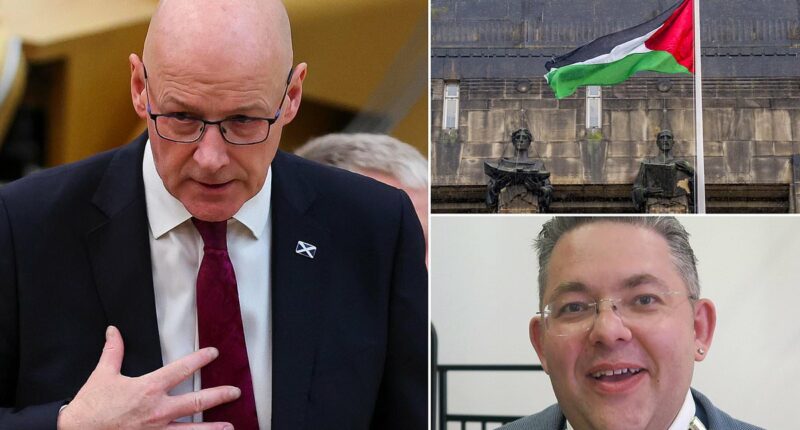Share this @internewscast.com
Leadership is more than taking decisions and exercising power. It is an ethos of character, judgement, temperance, and responsibility.
Knowing that your words bear not only the weight of their intended meaning but help shape the tone of the public debate.
A leader cannot be held responsible for the actions of the mad and malicious but he can – indeed, he ought to – consider whether his intervention is more likely to illuminate or inflame.
John Swinney knows this, which is why he and his colleagues are never shy about scolding opponents for their rhetoric on issues like immigration and asylum.
Yet the First Minister seemingly does not hold himself to a similar standard. His statement to Holyrood on the situation in Gaza was as inflammatory as it was unnecessary.
Foreign affairs are reserved to Westminster and five minutes watching Swinney’s statement and the debate that followed on Palestine recognition was more than enough to confirm why.
Nothing has done more to shatter the myth of Scotland’s gifted political class than giving them their own parliament.

First Minister John Swinney talking in Holyrood chamber

The Palestinian flag raised last week at St Andrew’s House
Swinney’s speech repeatedly suggested Israel was perpetrating genocide in Gaza, and while he’s entitled to that opinion as an individual and as leader of the SNP, he was speaking as First Minister of Scotland.
That is an office which has no standing to determine breaches of the Genocide Convention.
This is a government which routinely falls back on the excuse of ongoing legal proceedings to avoid answering tough questions about its policy decisions.
Such considerations have been dispensed with in the case of Israel as attacking Israel reflects the prejudices of the Scottish Government and, perhaps just as importantly with an election looming, the prejudices of some SNP voters.
We were always going to end up here. While the days following the October 7 pogrom in 2023 brought warm words about Israel’s right to defend itself, the sympathy quickly dried up once that defence got under way.
Western progressives will shed tears over dead Jews but the thought of living Jews fighting back appalls them.
Hamas, which is not only a terrorist organisation but the de facto government of Gaza, invaded Israel, a sovereign state. Palestinian marauders murdered 1,200 people, including children.
They slaughtered family members in front of one another. They gunned down young people dancing at a music festival. They raped and violated women.
And, once their bloodlust had been sated (for a while), they abducted 250 Israelis, including babies, and those they didn’t murder they held captive.
Dozens remain there still. In polling conducted by the Palestinian Centre for Policy and Survey Research (PCPSR) in December 2023, 72 per cent of Palestinians backed Hamas’s attack.
While that number now sits at 50 per cent, 77 per cent of Palestinians are opposed to Hamas being disarmed.
Swinney made reference to the role of Hamas, but neither his statement nor his government’s successful motion on recognising Palestine as a state explained what to do about them.
Recognising Palestine means recognising its government. A May poll from PCPSR asked Palestinians how they would vote in a hypothetical legislative election.
Hamas came out top on 43 per cent, 15 points ahead of its nearest rivals.
Centre-Left politicians want to recognise Palestine to punish Israel without considering who exactly they would be rewarding.
As oratory, Swinney’s speech was unremarkable, a patchwork of plodding civil service prose (imagine the English language being throttled by a lanyard) and the rhetorical style of the special adviser, those blunt-witted laureates of WhatsApp.
But one section in the middle stood out.
After calling on the UK to cease military cooperation with Israel, Swinney said: ‘I want to directly address accusations that that opinion could be seen as anti-Semitic. Let me be clear: I utterly reject anti-Semitism and all forms of racism and hatred.’
No one in the chamber, or anywhere else for that matter, had accused his speech of being antisemitic.
How could they? He was still in the middle of delivering it. Several days on, I have struggled to find examples of opposition MSPs, serious commentators, or mainstream organisations accusing Swinney of anti-Semitism.
A cynic might suggest that, in being first to raise the topic, Swinney was trying to preemptively shield himself from criticism.
As he acknowledged in his remarks, he and his External Affairs Secretary Angus Robertson met with representatives of Scottish Jews.
The First Minister said he ‘wanted to reassure them of the respect I have for the contribution the community makes to all aspects of Scottish life’.
He accepted events in Israel and Gaza, and the responses to them in Scotland, ‘cause anxiety’ for Scottish Jews.
Timothy Lovat, the chair of the Jewish Council of Scotland, had a different perspective. He noted Swinney and Robertson had offered ‘warm and reassuring words’, only for the First Minister to pop up in Holyrood taking a position which ‘we are concerned will undermine the safety, security and well-being of the Jewish community in Scotland’.
The Council says it is ‘indisputable the humanitarian situation in Gaza is dire’ and ‘beyond debate that both Israel and Hamas bear responsibility for this tragic situation’.
However, they describe Swinney’s official embrace of the genocide accusation as ‘irresponsible’, not least in its failure to distinguish between Israel, the nation-state of the Jewish people, and that country’s current government.
The council points out that Swinney’s statement is ‘likely to have a far greater and more immediate impact locally… than it is on the situation in the Middle East, let alone in Westminster’.
Being reminded of his place in the global pecking order might well sting the First Minister but the Council’s broader point is correct: he is the First Minister of Scotland and that is where his words will be heard.
Jewish representatives fear the possibility of Swinney’s comments ‘fuelling ‘anti-Zionist’ – and anti-Semitic – hatred and discrimination against Scotland’s Jews and our institutions and symbols’.
They cite Scotland’s only Jewish primary school and the possibility it might be ‘required to upgrade security provision in consequence of interventions by the Scottish Government and its leadership’.
It is obscene Scottish Jews are having to think in those terms – about a primary school no less – because we have a reckless First Minister who prefers to play politics than to exercise a modicum of judgement.
Anyone not familiar with the lives of British Jews might wonder if the Council is making too much of a leap with the primary school point.
History is littered with people insisting Jews were being paranoid, usually followed by horrific vindication of their paranoia.
The Community Security Trust is a UK charity tasked with keeping British Jews safe by funding enhanced security at Jewish schools and synagogues. (Yes, such an organisation is actually required.)

Timothy Lovat, the chair of the Jewish Council of Scotland
In the first six months of this year alone, the trust recorded 1,521 anti-Semitic incidents in the UK, 24 of them at Jewish schools and a further 41 against Jewish children on their way to or from school.
If MSPs wonder why they have angry emails in their inbox, that’s why.
Scotland’s Jewish community is small, enjoys vanishingly little in the way of political heft, and is not regarded by politicians as a key electoral demographic.
They don’t cause a fuss and so they and their interests can be disregarded.
But they shouldn’t need to be politically valuable for their concerns and their wellbeing to be valued.
They are entitled to a First Minister who acts with moderation and caution, who seeks to alleviate tensions rather than add to an already febrile atmosphere.
Scottish Jews expected a leader. They got John Swinney instead.








